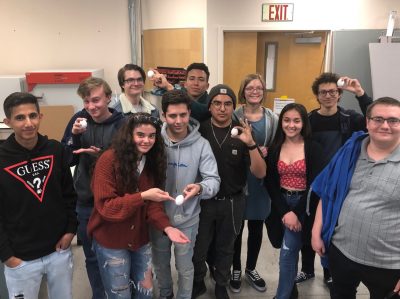DATE: 02/18/2020
WRITER: Minerva Baumann, 575-646-7566, mbauma46@nmsu.edu
CONTACT: Diana V. Dugas, 575-646-6498, dugasdvt@nmsu.edu
New Mexico State University was one of only 12 universities in the United States to receive a cyber-infrastructure training grant from the National Science Foundation in 2017. Now in its third and final year, NMSU’s Cyber Infrastructure Training and Mentoring program has demonstrated its success and is looking at extending the program at NMSU for a fourth year.
“We really seem to be filling a niche here,” said Diana V. Dugas, principal investigator of the CI-TraM project. “Our students are able to really connect what they’re learning in school, like the majors that they’re going to be focusing on, what they’re going to be getting their degrees in and a real world career; not only just the job that they will get afterwards, but also a career that they’re going to achieve once they leave the university.”
 |
||
|
CI-TraM students from left, Ahmed Abdaljalil, David Ewing, Hannah Severns, Kian Bianco, Dominick Nevares, Ernesto Castillo, Adolfo Escarcega, Zoe Palazzolo, Galilea Gutierrez, Tharwat Elkabani and Christopher Dickerson participate in the classic egg drop science experiment intended to teach middle and high school students about the relationship between force and momentum. (Courtesy photo) |
Over the past two years, the program has mentored and trained 94 interns, who trained for seven hours a week for two semesters at NMSU’s Computer Center as a job site to learn not only technology skills, but also receive career coaching.
“This year we have had one of our former CI-TraM students, Charity Dilks, come back as a program manager,” Dugas said. “We also have somebody from DACC who is a program manager. As a part of trying to get the programs established on campus, we’ve been meeting with various departments and various colleges, recruiting undergraduates and, surprisingly enough, graduate students into the program as well.”
The CI-TraM team consists of Dugas, co-principal investigators Satyajayant Misra, computer science professor, Hameed Badawy, electrical and computer engineering professor, and Brian Ormand, a mentor and project manager in NMSU’s Information and Communication Technologies department manager, as well as Hannah Mireles, program manager and Charity Dilks, student program manager.
“CI-TraM is an amazing program that really focuses on each student individually and helps them better understand what they want from their futures,” Dilks said. “I wanted to stay with the program once I graduated high school to help new students the way the program helped me to actively work towards my goals.”
Ormand is focused on helping students learn more about how to operate in the workplace and has coordinated the high school students placed at NMSU’s Computer Center and worked with Dugas to initiate the program.
“One of the best things the CI-TraM program teaches students is to take ownership of managing their own career path at a critical time in their lives,” Ormand said. “Interns learn how to identify, meet and talk to the right people that can advise their career path. They also learn what information, technology, experiences and credentials should be priorities for their career area(s) of interest. All the skills learned in CI-TraM will serve a person well even if later they change their career goal.”
Dugas leads a technical pathway that has students learn more about technology, critical for success in all STEM fields. CI-TraM does more than give them hands-on experience in computer fields. While they prep students for interviews and help them write resumes, they also open students’ eyes to just how broad ranging the opportunities are for students with technical experience and a willingness to learn more.
“My favorite part is getting them to realize that all of those types of companies, whether they are academic institutions or private companies, require a wide breath of people,” Dugas said. “So if you’re looking at say, an oil company, don’t write them off. They don’t just need chemical engineers, they need people who write code as well.
“The nice thing about the CI-TraM program is that it gets you to start thinking past the classes you’re taking and considering what you’re actually going to do with your life.”
In a survey of past interns last summer, Mireles received feedback that indicates the CI-TraM program is effective.
“A majority of students felt they gained communication and networking skills that have helped them gain confidence to talk to people in their field of interest,” Mireles said. “Many of the students also advised that this internship helped them with job seeking skills like resume building and interview skills. Students also mentioned they were able to make connections with faculty, staff and other resources at NMSU, which ultimately played a part in their decision to attend NMSU.”
The NMSU program is developing a model that can be used by other institutions. The team will continue to follow these students’ long-term progress after they graduate from college to see how they incorporate technology and the other skills they’ve learned into their careers.
